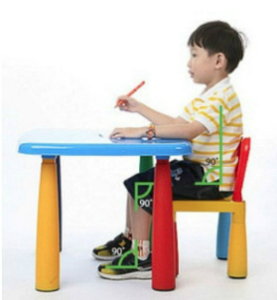Correct Desk & Chair Positioning for Children
Learning – how we learn & where we learn especially – looks different than it did a few years ago. More & more students are trading classrooms for bedrooms or kitchen tables. How can we bring all of the benefits of the normal classroom setting into our virtual learning environments? A great place to start is literally where your child is sitting. Correct desk & chair positioning is a key component in maximizing your child’s learning environment & setting them up for success.
When it comes to maximizing your student’s learning, whether it be in person or online, proper desk and chair position are essential. Properly positioning your child’s desk and chair will help them stay focused, pay attention, and write neatly.
Correct desk & chair positioning components
There are two main components to look at when it comes to establishing proper seating – body positioning and desk height.

Body Positioning
To start, take a look at your child when they are sitting in their chair. You want their feet to be flat on the floor, with ankles, knees and hips at approximately 90 degrees.
Desk Height
Next, I would like you to take a look at your child when they are sitting & pushed up to their desk or work space. We want the top of the desk/work space to be slightly above the bottom of their ribcage or (with their elbows bent) 2-3 inches above the elbow.
Troubleshooting tips for desk & chair positioning
Perhaps your child’s chair is too tall and they have to sit closer to the edge of their seat to reach the floor. Or your child could have a long torso and their desk does not reach the bottom of their ribcage.
In these situations, you could experiment with using different chair accessories or alternative seating options.
If your child’s chair is too tall –
Try using foot straps on the chair legs or on the table legs. I’ve seen teachers use bungee cords and pool noodles to make a footrest that is attached to the chair legs. Rocker boards, foot rests, cushions and old telephone books (do they still exist?!) can also be used under the desk to support the feet.
If your child’s desk is not tall enough –
Try propping up the desk on wooden boards or even look into buying risers to elevate the desk. Keep in mind as you problem solve & experiment with other solutions that you don’t want the desk to become wobbly. In some instances, perhaps it would be better to try out a new workspace somewhere else in the house, or if you have the resources, purchase a new desk that will fit your child.
When it comes to non traditional learning environments, it is vital our students have the proper desk & chair positioning to ensure they are getting the most out of their learning experience. We want to make sure their ankles, knees, & hips are at a 90 degree angle, & that their desk comes up to just above their ribcage (or 2 – 3 inches above their elbows, when bent).
If this isn’t the case for your little virtual learner – no worries! You can easily get creative & use things like cushions, books, and pool noodles to make adjustments to ensure your child has the perfect fit.
Are you concerned with your child’s handwriting skills? We’d love to talk through your concerns with you. Please fill out our contact form and we will be in touch as soon as possible!
*This post contains affiliate links
Want to improve finger strength & control?
Download our free tracing patterns! These tracing patterns are a fun way to build finger muscles & improve control. Have your child trace these patterns as a warm up for writing so they can do their best work!
Want to know more about sensory processing, self regulation, child development, & more? Our resource library is full of free crash courses, guides, and tools to help you understand more about your child & how you can support them outside of therapy.
Get your free resources!
show me the resources